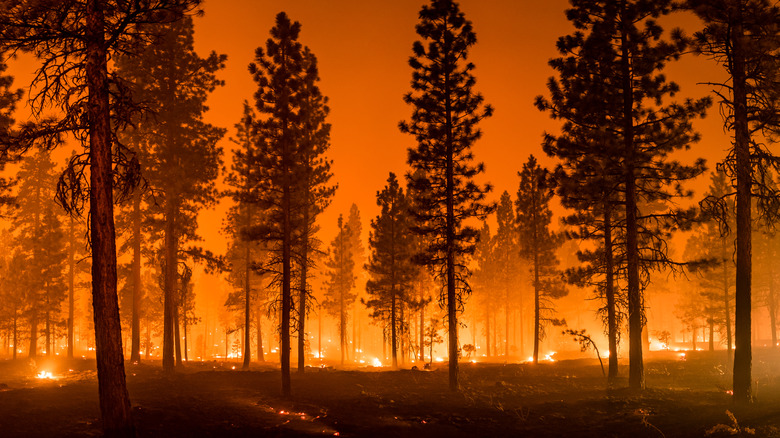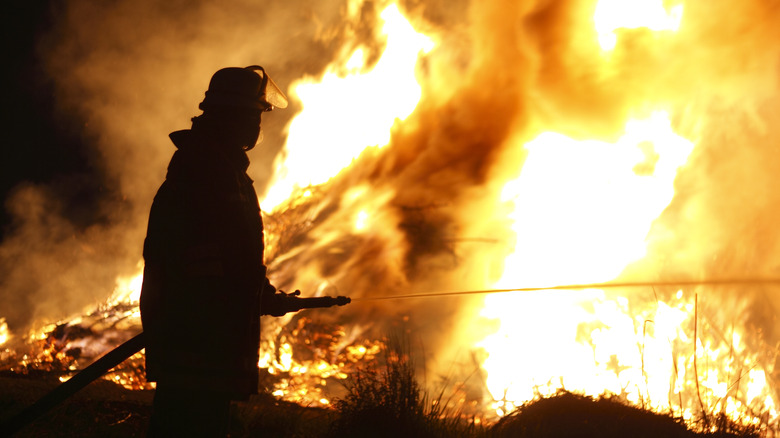How Long Can Wildfires Burn?
With wildfires getting worse year by year, residents of places like California, Siberia, and New South Wales need to be on constant guard that their homes and lives won't be consumed in a flash. In August 2022, the World Resources Institute compiled data to show that heat waves — driven by global warming — are five times higher than they were 150 years ago. Nearly twice as many trees are lost in wildfires now compared to 20 years ago. Landscapes are drying out. Wildfires not only happen more frequently but across a longer burn season, especially at higher latitudes. And in a truly horrifying cycle of destruction, more burned trees mean more CO2 in the atmosphere, which accelerates global warming.
Such looming threats leave folks with many questions. When are wildfires likely to start? What do you do if a wildfire starts near you? And once evacuated, when can you go home? After all, wildfires aren't exactly the easiest thing to stop once started. The U.S. Office of Wildland Fire cites fire suppression techniques like removing burnable fuel from a fire's path. But because of global warming and its ever-worsening effects, suppression costs in the U.S. doubled from $200 to $400 million from 1994 to 2018. There are more fires, stronger fires, the burn season lasts longer, and wildfires themselves last much longer now than they did in the past. Before 1986, The Western Fire Chiefs Association says that fires lasted about eight days. By 2013, they lasted 37 days.
Death by fire, smoke, and disease
While it's true that wildfires sometimes happen naturally, like from a lightning strike, the Western Fire Chiefs Association says that 90% of wildfires are manmade. Once started, the Western Fire Chiefs Association also says that they spread at a speed of over 14 miles per hour, or four minutes per mile. Weather conditions not only contribute greatly to the cause of wildfires, but they also contribute to the spread, depending on wind speed and direction.
The strength, burn season, and duration of modern wildfires all go back to climate change. The Western Fire Chiefs Association says that as the globe gets drier, it's harder for clouds to form. This increases the likelihood of drought, which causes more wildfires to start, especially if people are thoughtless and do things like flick away cigarettes in the woods or don't completely put out campfires, as National Geographic explains.
The destructive effects of wildfires aren't limited to flames torching structures and flesh. The smoke produced from wildfires can carry hundreds, even thousands of miles, like smoke from Ontario and Quebec's June 2023 fires traveling all the way south to Georgia in the U.S. Even worse, the European Commission says that smoke becomes more toxic the longer it lingers in the air. When inhaled, it damages cells and creates unstable molecules, i.e., free radicals. Medical News Today links free radicals to every disease from Alzheimer's to cancer, and Parkinson's to diabetes.
Prevention and safety
In case you're thinking of throwing your hands up at this point and saying, "Forget it, we're doomed," take heart. The average wildfire might be bigger and badder than ever, and last longer than a month, but there are at least some things that you as an individual can do to protect yourself from a wildfire. You might not be able to wave a magic wand and whisk away global warming, or snuff out a wildfire with a giant handkerchief, or move to a less fire-prone area, but you can at least act preventatively within your means.
Besides being careful to not start a wildfire to begin with, the Western Fire Chiefs Association discusses what it calls home hardening: ways to increase the safety of one's house and yard. For instance, because fires can spread from embers flying off of objects, direct contact with flames, and short vegetation, it's good to surround a house with some space. The design of eaves, roofs, vents, walls — all of these and more impact the spread of fire.
But because we cited a 37-day length for current wildfires, none of those measures will do much good if your house gets caught in a blaze early on. In that case, the best thing someone could do is save money to book a hotel for a bit, and have an emergency kit ready in case of evacuation. And barring either of those things: very strong legs or a full tank of gas.

